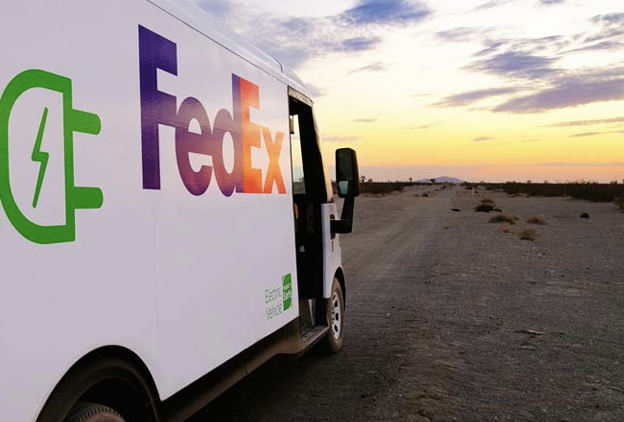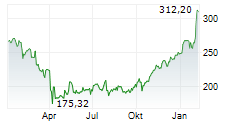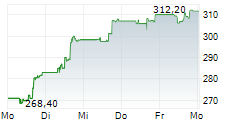
NORTHAMPTON, MA / ACCESS Newswire / February 18, 2025 / Originally published in FedEx's 2024 Global Economic Impact Report
Delivering a more sustainable future
FedEx works hard every day to make global supply chains smarter for everyone by leveraging advanced technologies to help optimize logistics. These efforts have a natural alignment with the company's longstanding work to improve the efficiency and sustainability of its operations.
Between FY 2009 and FY 2023, FedEx reduced its carbon dioxide equivalent emissions intensity on a revenue basis by 48%, even as volume grew by 121%. Further, the company continues to address the challenges presented by climate change as it works toward a goal of carbon neutral global operations by 2040, guided by our strategy: decarbonize what's possible, co-create with purpose, and neutralize what's left.
FedEx is determined to continue making progress on its operational goals while also providing direct investments and advocacy to promote sustainable technologies and practices that will help transform the transportation and logistics sector.37
Transportation fleets and fuels
Electrification offers a significant opportunity to reduce the environmental impact of the FedEx global fleet, which includes more than 200,000 motorized vehicles across several vehicle classes. FedEx has set a goal of transitioning its entire parcel pickup and delivery (PUD) fleet to zero-tailpipe emission vehicles by 2040. In addition to these fleet electrification efforts, FedEx is working to reduce emissions from road and air transport by incorporating cost-effective alternative fuels and modernizing its fleet.
In FY 2024, FedEx added EVs in several markets, including EVs and zero-tailpipe emission motorcycles in Brazil, and dozens of EVs across markets like Canada, Chile, Spain, the UK, the Netherlands, the UAE, and U.S. Since first deploying EVs in Mainland China in 2018, FedEx has electrified 20% of its PUD fleet in the country.
In February 2024, FedEx made history by completing the first delivery of a cross-border package via an EV from Malaysia to Singapore. The historic journey was 252 miles and avoided approximately 220 pounds of tailpipe CO2 emissions when compared to making the same journey with a diesel-powered van. The attempt was recognized by the Malaysian Book of Records for "First Malaysian Zero Emission Cross-Border Delivery."
FedEx continued to build out charging stations at its facilities worldwide in FY 2024 - including the U.S., Spain, Canada, the UK, and the UAE - to support the ongoing electrification of its parcel PUD fleet and to enable greater EV adoption by the company's independent service providers.
FedEx expanded its fleet of e-cargo bikes in FY 2024, adding eight four-wheeled e-cargo bikes in the UK to replace six conventional diesel vans, introducing five commercial electric tricycles to its PUD fleet in Taiwan, and a new e-cargo bike model in Canada.
In 2023 and early 2024, FedEx Freight in the U.S. took delivery of 36 Class 7 and 8 heavy-duty EV trucks.
To expand its use of low-carbon fuels, FedEx launched a trial for long-haul vehicles running on hydrotreated vegetable oil, a renewable diesel, in the UK.
FedEx continues to pursue its ongoing air fleet modernization strategy, which replaces older aircraft with more fuel-efficient models to reduce GHG emissions, air pollution, and local noise pollution. In FY 2024, FedEx permanently retired 31 jet aircraft from the company's fleet. The company also added 10 new 767s and four new 777s, which are more fuel efficient than the aircraft they replaced. Since 2005, these fleet modernization efforts have helped reduce the overall emissions intensity of the FedEx air fleet by 29%, as of FY 2023.
Sustainable facilities
When building or expanding facilities, FedEx includes programs and technology to manage waste, conserve water, and reduce the carbon footprint of its operations.
In addition to the facilities and projects highlighted in the regional spotlight sections of this report, other notable projects from FY 2024 include:
FedEx opened its refurbished gateway at the Adolfo SuárezMadrid Barajas Airport, which includes a 156-panel solar array that is estimated to produce approximately 95 megawatt hours of electricity annually. The panels will produce about 17% of the facility's energy needs. Other sustainable features include LED lighting and a smart water management system to reduce water use.
FedEx in Mainland China launched a "GoGreen" contest - in which more than 11,000 FedEx team members participated - to save water, electricity, fuel, and paper in day-to-day operations.
FedEx opened its Asia Pacific headquarters in Singapore, using green-certified renovation products. About 80% of the new materials meet local certification standards. Additionally, the building features energy-efficient electrical fixtures and automatic lighting controls to reduce energy consumption.
FedEx China's new headquarters in Shanghai, which opened in January 2024, utilizes a variety of leading energy-saving technologies and facilities, notably LED sensor lights in work areas that automatically adjust lighting levels based on employee density and needs. The facility is LEED (Leadership in Energy and Environmental Design) Gold certified.
In Thailand, FedEx collaborated with N15 Technology to turn more than 120 kilograms of waste - such as plastic wrap, label stickers, and paper cores - into refuse-derived fuel.
In Morwell, Australia, FedEx opened a new shipping station equipped with sustainable building features to reduce impact on the environment, including energy-saving LED lighting and a system to collect and reuse rainwater on site.
Empowering customers and communities
Along with efforts to reduce the environmental impact of its business operations, FedEx also provides tools to empower customers that are working toward their own sustainability goals and deploys resources to support emerging climate technology solutions and more sustainable communities.
First launched in the U.S. in May 2023, FedEx® Sustainability Insights is now available in 34 languages and in more than 100 markets around the world. The tool allows customers to estimate the carbon footprint of their eligible shipments within the FedEx network, supporting their own emissions reporting.
FedEx and the World Resources Institute have been teaming up since 2010 to create what is now the Mobility and Accessibility Program (MAP). MAP is helping cities around the world transform their public transportation systems, making them safer, more efficient, and more sustainable. Now in its 15th year, MAP has impacted more than 23 million people while avoiding over 1 million MT CO2e. Key programs include the expansion of Mobility-as-aService into Shanghai, supporting India's pledge of 50,000 electric buses by 2027, and significantly improving accessibility and safety with 2,000 new bus shelters in two Brazilian cities.
For the second year in a row, FedEx funded EIT Climate-KIC's Sustainable Cities Mobility Challenge in Europe. In FY 2024, five cities across Spain, Portugal, the Netherlands, and the UK were selected to receive funding for projects that support the transition toward cleaner, greener, and more people-friendly transport.
For more information on FedEx sustainability efforts worldwide, see the 2024 ESG Report.
37 This section includes a preview of FedEx sustainability achievements and advancements from FY 2024. A comprehensive summary of enterprise-wide sustainability data for FY 2024 will become available in the next iteration of the FedEx ESG Report, set to be published in CY 2025.
Read more
Click here to learn about FedEx Cares, our global community engagement program.

View additional multimedia and more ESG storytelling from FedEx Services on 3blmedia.com.
Contact Info:
Spokesperson: FedEx Services
Website: https://www.3blmedia.com/profiles/fedex-services
Email: info@3blmedia.com
SOURCE: FedEx Services
View the original press release on ACCESS Newswire



